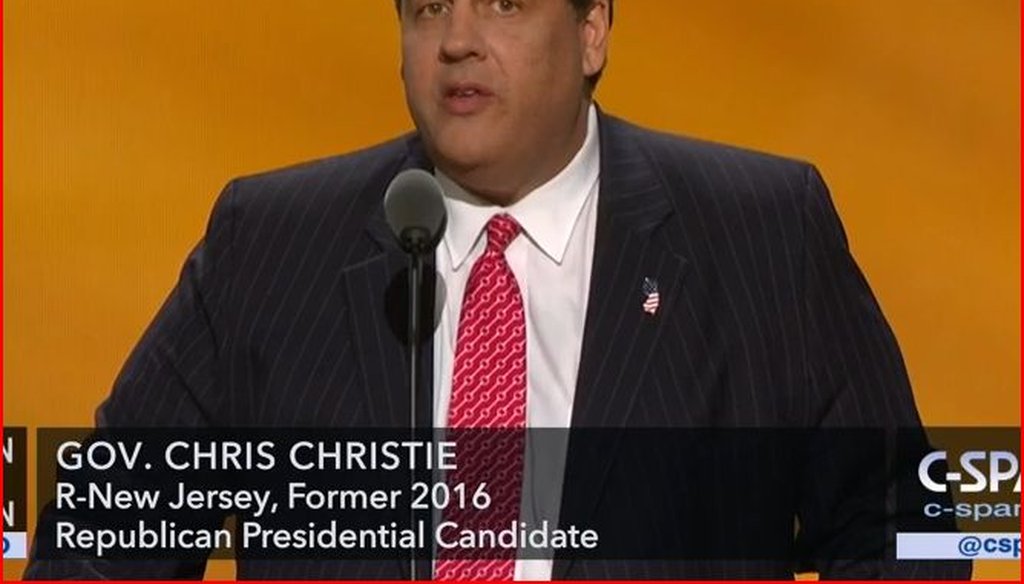Stand up for the facts!
Our only agenda is to publish the truth so you can be an informed participant in democracy.
We need your help.
I would like to contribute

Gov. Chris Christie recently presented a $32.9 billion budget for fiscal year 2014 to the state Legislature.
Not everything in Gov. Chris Christie’s budget address Tuesday was original.
In fact, the Republican governor cited a number of highlights about New Jersey government that have been checked before on PolitiFact New Jersey’s Truth-O-Meter. Christie proposed a $32.9 billion spending plan for fiscal year 2014.
We’ll recap some of those claims here.
Increasing taxes, fees
Early on in his budget address, Christie said his proposed budget is balanced for the fourth year in a row, and reminded listeners that the state’s fiscal climate was dramatically different in the years before he took office.
"I want every New Jersey citizen to remember just how different things were before we arrived. (One hundred fifteen) tax and fee increases in eight years. Skyrocketing spending. (Thirteen) billion in deficits left on our doorstep by the irresponsibility of the past."
The Truth-O-Meter first reviewed this claim in October 2011, when it was made by state Sen. Tom Kean Jr. (R-Westfield), and again this past January when Christie repeated a modified version of it. Kean's claim was rated Half True, Christie's was True.
Christie is correct that the state approved 115 increases in taxes and fees in the eight years before he took office. Democrats held the majority during that time. Although most of the bills in question were sponsored by Democrats, a few had Republican support.
Defining deficits
As for the $13 billion in deficits, the debt Christie claims was left for him is a mix of real and theoretical money. We have reviewed that point in each version of the three fact-checks we have done on this claim.
When Christie took office on Jan. 19, 2010 -- halfway through the fiscal 2010 budget year -- his predecessor’s spending plan had a $2.2 billion shortfall. Christie used several measures to close the gap, including cutting $475 million in local school aid.
So where’s the rest of the $13 billion?
It’s money that the state’s nonpartisan Office of Legislative Services referred to as a structural deficit for the fiscal 2011 budget year. A structural deficit measures how much money the state would need to fully fund current services and required spending, and if revenues remained the same.
The budget, however, supersedes state statute so the governor can sign a budget that does not fund required spending. In Christie’s case, he has claimed other times that he cut that much from the budget, but the truth is he never spent it. A claim about how the governor balanced a budget with $13 billion in deficits rated Half True on the Truth-O-Meter.
Since he’s been in office, however, Christie has dismissed structural deficits as the "old way of budgeting" and now says the state uses zero-based budgeting. Structural deficits still exist, however. In fact, Christie’s $32.9 billion budget proposal for fiscal year 2014 contains a $3 billion structural deficit.
Spending control?
In laying out the highlights of his budget proposal, Christie said the state’s needs are being met "by spending less than the state spent in Fiscal Year 2008."
We checked that claim in February and determined that it was Mostly True. The original claim left out that spending has still increased with each new state budget since Christie took office in 2010.
In his first budget after taking office, Christie approved an approximate $28.36 billion spending plan for fiscal year 2011. For the next budget year -- fiscal year 2012 -- the governor approved a budget of about $29.69 billion.
That means, in terms of the annual appropriations acts signed by Christie, state spending has increased by about $3.29 billion, or 11.6 percent, between fiscal years 2011 and 2013.
Ending institutionalization
Christie also repeated claims from January and February 2012 about where New Jersey ranks against other states for institutionalizing the mentally ill.
"We have institutionalized more citizens than any state other than Texas," the governor said Tuesday.
That statistic is generally accurate, based on the population of large, state-operated institutions. Only Texas has more people with developmental disabilities in such institutions than New Jersey.
But as a rate compared to the general population, Arkansas and Mississippi institutionalize more people with developmental disabilities than New Jersey. Texas is 43rd by that measure. The original claim was rated Mostly True.
To comment on this story, go to NJ.com.
Our Sources
Governor Chris Christie's Fiscal Year 2014 Budget Address As Prepared For Delivery, Feb. 26, 2013
PolitiFact New Jersey, Chris Christie claims state spending is lower today than under Gov. Jon Corzine in fiscal year 2008, Feb. 13, 2013, accessed March 2, 2013
PolitiFact New Jersey, Chris Christie says taxes, fees raised 115 times in the 8 years before he became governor, Jan. 10, 2013, accessed March 1 and 2, 2013
PolitiFact New Jersey, Chris Christie says New Jersey faced an $11 billion deficit in fiscal year 2011, Jan. 9. 2013, accessed March 2, 2013
PolitiFact New Jersey, Chris Christie says he balanced a budget with an $11 billion deficit, Aug. 28, 2012, accessed March 1 and 2, 2013
PolitiFact New Jersey, Chris Christie claims in keynote address that taxes in New Jersey "were raised 115 times in eight years," Aug. 28, 2012, accessed March 2, 2013
PolitiFact New Jersey, Chris Christie says he cut $13 billion in state spending over two years, March 4, 2012, accessed March 1 and 2, 2013
PolitiFact New Jersey, Chris Christie claims only Texas institutionalizes more developmentally disabled people than New Jersey, Feb. 26, 2012, accessed March 2, 2013
PolitiFact New Jersey, Tom Kean Jr. says Democratic tax hikes chased jobs out of New Jersey, Oct. 16, 2011, accessed March 2, 2013
PolitiFact New Jersey, Chris Christie claims he balanced two budgets while facing $13 billion in deficits and didn't raise taxes, Oct. 2, 2011, accessed March 1 and 2, 2013











































